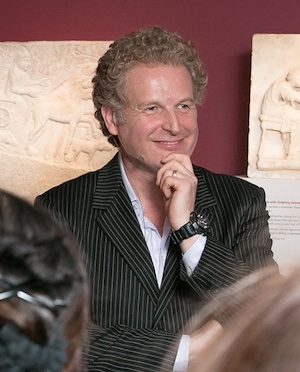By Lucie Turkel
In our technologically dependent and fast-paced world, it can seem difficult to make the connection between our modern lives and the lives of those who lived in antiquity. And even if such a connection does exist, why is it worthwhile to explore? These questions—and their subsequent answers—are the main factors that guide the work and life of New York University Professor of Classics in the Modern World Peter Meineck.
Meineck, who is part of the 2020-2021 Phi Beta Kappa Visiting Scholar Program, was interested in the study of antiquity and its application to the present day from a young age. In a discussion with ΦBK Secretary and CEO Fred Lawrence during a Key Conversations with Phi Beta Kappa podcast episode, Meineck explained the influence of his mother, an elementary school teacher, and his uncle, an archeologist, on his interests growing up. At the age of sixteen, however, Meineck switched gears and joined the Royal Marines. While enlisted, he was sent to university and began his formal study of classics at University College London.
Although Meineck stayed within the realm of academia rather than returning to the Royal Marines, his interest in both the intellectual and literal manifestation of the crossroads of ancient performance and combat and its relevance in the modern world continued: today, in addition to his NYU post, Meineck is an honorary professor of the humanities at the University of Nottingham in the UK, the founder of Aquila Theatre Company, and a fire chief at Bedford Fire Department in New York.
Meineck virtually participated in his first Visiting Scholar event at the University of Arkansas on March 10 and 11. While there, he gave three virtual presentations: “Staging Greek Drama: New Research,” hosted by the U of A Department of Theatre Chair Michael Riha; “Ancient Democracy and the Inter-Related Roles of the Theatre and Military,” hosted by U of A Assistant Professor of Classics Rhodora Vennarucci; and “Classics in the Modern World,” a public lecture that was open to all of U of A and its surrounding community.
Meineck’s public lecture focused on the multiple initiatives he created in order to apply classics to public programming by working with specific communities, most notably veterans and refugees. His initial project, an NEH-endowed program entitled Ancient Greeks, Modern Lives, partnered with public libraries across the country to host stage readings given by actors and explained by expert classics professors. The purpose of the program was to get people to relate their own experiences to the material that was being read through lively discussion.
It was during Ancient Greeks, Modern Lives that Meineck noticed the formation of a veteran community within his programming. This inspired another national initiative, called The Warrior Chorus, which trained veterans to present their own public programming based on ancient literature alongside classics professors. Through The Warrior Chorus, the way in which ancient Greek plays resonated with modern day veterans became apparent. He shared the story of Bryan, one such actor and veteran, who said after reading a scene in a play that triggered a repressed memory within him, “I know that I’m not alone in my memories because Euripides wrote a play about it.”
Another of Meineck’s projects through the Aquila Theatre, Hear Our Call, is a three-week summer program held at NYU for teens specifically from refugee, immigrant, or asylee families. Meanwhile, his initiative Shakespeare Warriors is an afterschool program at Frederick Douglass Academy in Harlem in which students learn community, discipline, and structure while they work on classical texts to perform.
“Classics [can be] a vital force for social activism, for discussion, and even for change,” Meineck concluded.
Daniel Levine, the section head of classics at U of A and the president of the ΦBK Alpha of Arkansas chapter, prepared for Meineck’s visit with the help of Riha and Vennarucci. “I’ve been teaching at this university for 41 years and have had a lot of experience with the Phi Beta Kappa Visiting Scholar Program,” Levine said. “Every single speaker we’ve had from them is provocative, fresh, exciting, and challenging.”
For more information on the Visiting Scholar Program, visit the Phi Beta Kappa website here.
Lucie Turkel is a senior at the University of Connecticut pursuing an individualized major in comparative literary and cultural studies and was inducted into Phi Beta Kappa in May 2020. UConn is home to the Epsilon of Connecticut chapter of Phi Beta Kappa.




